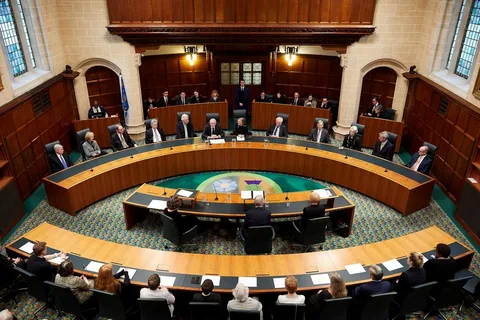In a landmark ruling, the UK’s Supreme Court has declared that artificial intelligence (AI) programs cannot be named as inventors in patent applications. The decision came in response to a request by Stephen Thaler, the founder of Imagination Engines Inc., who sought to patent his AI machine, called DABUS, as the inventor. The judges unanimously dismissed Thaler’s appeal, stating that patent laws require the inventor to be a natural person, and DABUS does not qualify as a person.
This ruling aligns with previous decisions in the United States and the European Union, but it is the first of its kind by a country’s highest court. Its significance lies in the fact that the UK has been striving to establish itself as a leader in AI technologies, and discussions surrounding safeguards and regulations for AI are ongoing.
Thaler, who had attempted to register patents for a beverage container and a flashing light, expressed his disappointment with the outcome, claiming that science has clashed with common sense in a highly significant way.
Legal experts have raised concerns about the potential implications of the ruling. Robert Jehan, a partner at law firm Williams Powell, which represented Thaler, argued that it puts the UK at a disadvantage in supporting industries that heavily rely on AI. He also stated that it may discourage the disclosure of inventions by AI systems. Jehan criticized the current UK patent law, claiming that it does not effectively support the country’s goal of becoming a global hub for AI and data-driven innovation.
Yohan Liyanage, a partner at law firm Linklaters, suggested that this issue may need to be revisited in the future, considering the rapid advancement of AI capabilities. He proposed the possibility of legislative intervention to allow patentability of AI-created inventions, should the UK government genuinely aspire to become an AI superpower.
It is important to note that the court’s ruling does not address the broader question of whether technical advances made by autonomous AI-powered machines are patentable.
Rajvinder Jagdev, a partner at law firm Powell Gilbert, clarified that the judgment does not prevent individuals from using AI to develop inventions. In such cases, a patent can be applied for as long as the person using AI is identified as the inventor.
The judges agreed with the government’s lawyers, who argued that granting Thaler’s request would make the UK an outlier in terms of patent laws. They expressed concerns that if the request was approved, future inventors could include non-human entities, such as animals or cosmic forces.
The UK’s Intellectual Property Office stated that any changes to patent laws to support the country’s AI ambitions would require international deliberations. However, they assured that the government will continue to review this area of law to ensure that it promotes AI innovation and its use in the UK.
*Note:
1. Source: Coherent Market Insights, Public sources, Desk research
2. We have leveraged AI tools to mine information and compile it




